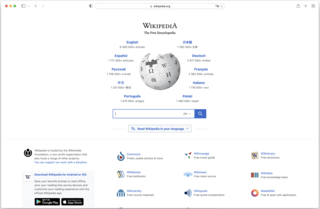
Hypertext Transfer Protocol Secure (HTTPS) is an extension of the Hypertext Transfer Protocol (HTTP). It uses encryption for secure communication over a computer network, and is widely used on the Internet. In HTTPS, the communication protocol is encrypted using Transport Layer Security (TLS) or, formerly, Secure Sockets Layer (SSL). The protocol is therefore also referred to as HTTP over TLS, or HTTP over SSL.

A web browser is an application for accessing websites. When a user requests a web page from a particular website, the browser retrieves its files from a web server and then displays the page on the user's screen. Browsers are used on a range of devices, including desktops, laptops, tablets, and smartphones. In 2020, an estimated 4.9 billion people have used a browser. The most-used browser is Google Chrome, with a 64% global market share on all devices, followed by Safari with 19%.

Mozilla Firefox, or simply Firefox, is a free and open-source web browser developed by the Mozilla Foundation and its subsidiary, the Mozilla Corporation. It uses the Gecko rendering engine to display web pages, which implements current and anticipated web standards. Firefox is available for Windows 10 or later versions, macOS, and Linux. Its unofficial ports are available for various Unix and Unix-like operating systems, including FreeBSD, OpenBSD, NetBSD, illumos, and Solaris Unix. It is also available for Android and iOS. However, as with all other iOS web browsers, the iOS version uses the WebKit layout engine instead of Gecko due to platform requirements. An optimized version is also available on the Amazon Fire TV as one of the two main browsers available with Amazon's Silk Browser.
This is a comparison of both historical and current web browsers based on developer, engine, platform(s), releases, license, and cost.

The Mozilla Application Suite is a discontinued cross-platform integrated Internet suite. Its development was initiated by Netscape Communications Corporation, before their acquisition by AOL. It was based on the source code of Netscape Communicator. The development was spearheaded by the Mozilla Organization from 1998 to 2003, and by the Mozilla Foundation from 2003 to 2006.

Google Analytics is a web analytics service offered by Google that tracks and reports website traffic and also the mobile app traffic & events, currently as a platform inside the Google Marketing Platform brand. Google launched the service in November 2005 after acquiring Urchin.
In computer science, session hijacking, sometimes also known as cookie hijacking, is the exploitation of a valid computer session—sometimes also called a session key—to gain unauthorized access to information or services in a computer system. In particular, it is used to refer to the theft of a magic cookie used to authenticate a user to a remote server. It has particular relevance to web developers, as the HTTP cookies used to maintain a session on many websites can be easily stolen by an attacker using an intermediary computer or with access to the saved cookies on the victim's computer. After successfully stealing appropriate session cookies an adversary might use the Pass the Cookie technique to perform session hijacking. Cookie hijacking is commonly used against client authentication on the internet. Modern web browsers use cookie protection mechanisms to protect the web from being attacked.
Server Name Indication (SNI) is an extension to the Transport Layer Security (TLS) computer networking protocol by which a client indicates which hostname it is attempting to connect to at the start of the handshaking process. The extension allows a server to present one of multiple possible certificates on the same IP address and TCP port number and hence allows multiple secure (HTTPS) websites to be served by the same IP address without requiring all those sites to use the same certificate. It is the conceptual equivalent to HTTP/1.1 name-based virtual hosting, but for HTTPS. This also allows a proxy to forward client traffic to the right server during TLS/SSL handshake. The desired hostname is not encrypted in the original SNI extension, so an eavesdropper can see which site is being requested. The SNI extension was specified in 2003 in RFC 3546

Mozilla Firefox 4 is a version of the Firefox web browser, released on March 22, 2011. The first beta was made available on July 6, 2010; Release Candidate 2 was released on March 18, 2011. It was codenamed Tumucumaque, and was Firefox's last large release cycle. The Mozilla team planned smaller and quicker releases following other browser vendors. The primary goals for this version included improvements in performance, standards support, and user interface.

Google Chrome is a web browser developed by Google. It was first released in 2008 for Microsoft Windows, built with free software components from Apple WebKit and Mozilla Firefox. Versions were later released for Linux, macOS, iOS, and also for Android, where it is the default browser. The browser is also the main component of ChromeOS, where it serves as the platform for web applications.

Private browsing, also known as incognito mode or private mode, is a feature available in web browsers that allows users to browse the internet without leaving any traces of their online activity on their device. In this mode, the browser initiates a temporary session separate from its main session and user data. The browsing history is not recorded, and local data related to the session, like Cookies and Web cache, are deleted once the session ends. The primary purpose of these modes is to ensure that data and history from a specific browsing session do not remain on the device or get accessed by another user of the same device.

Clickjacking is a malicious technique of tricking a user into clicking on something different from what the user perceives, thus potentially revealing confidential information or allowing others to take control of their computer while clicking on seemingly innocuous objects, including web pages.
Firefox Sync, originally branded Mozilla Weave, is a browser synchronization feature for Firefox web browsers. It allows users to partially synchronize bookmarks, browsing history, preferences, passwords, filled forms, add-ons, and the last 25 opened tabs across multiple computers. The feature is now included in Firefox and is being implemented in Thunderbird.
Firefox was created by Dave Hyatt and Blake Ross as an experimental branch of the Mozilla browser, first released as Firefox 1.0 on November 9, 2004. Starting with version 5.0, a rapid release cycle was put into effect, resulting in a new major version release every six weeks. This was gradually accelerated further in late 2019, so that new major releases occur on four-week cycles starting in 2020.
Browser security is the application of Internet security to web browsers in order to protect networked data and computer systems from breaches of privacy or malware. Security exploits of browsers often use JavaScript, sometimes with cross-site scripting (XSS) with a secondary payload using Adobe Flash. Security exploits can also take advantage of vulnerabilities that are commonly exploited in all browsers.
Mozilla is a free software community founded in 1998 by members of Netscape. The Mozilla community uses, develops, publishes and supports Mozilla products, thereby promoting exclusively free software and open standards, with only minor exceptions. The community is supported institutionally by the non-profit Mozilla Foundation and its tax-paying subsidiary, the Mozilla Corporation.
HTTPS Everywhere is a discontinued free and open-source browser extension for Google Chrome, Microsoft Edge, Mozilla Firefox, Opera, Brave, Vivaldi and Firefox for Android, which was developed collaboratively by The Tor Project and the Electronic Frontier Foundation (EFF). It automatically makes websites use a more secure HTTPS connection instead of HTTP, if they support it. The option "Encrypt All Sites Eligible" makes it possible to block and unblock all non-HTTPS browser connections with one click. Due to the widespread adoption of HTTPS on the World Wide Web, and the integration of HTTPS-only mode on major browsers, the extension was retired in January 2023.

Bitwarden is a freemium open-source password management service that stores sensitive information, such as website credentials, in an encrypted vault. The platform offers a variety of client applications, including a web interface, desktop applications, browser extensions, mobile apps, and a command-line interface. Bitwarden offers a free US or European cloud-hosted service as well as the ability to self-host.
Firefox Lockwise is a deprecated password manager for the Firefox web browser, as well as the mobile operating systems iOS and Android. On desktop, Lockwise was simply part of Firefox, whereas on iOS and Android it was available as a standalone app.
Firefox Send was a free and open-source end-to-end encrypted file sharing web service developed by Mozilla. It was operational from August 1, 2017 until July 7, 2020.








